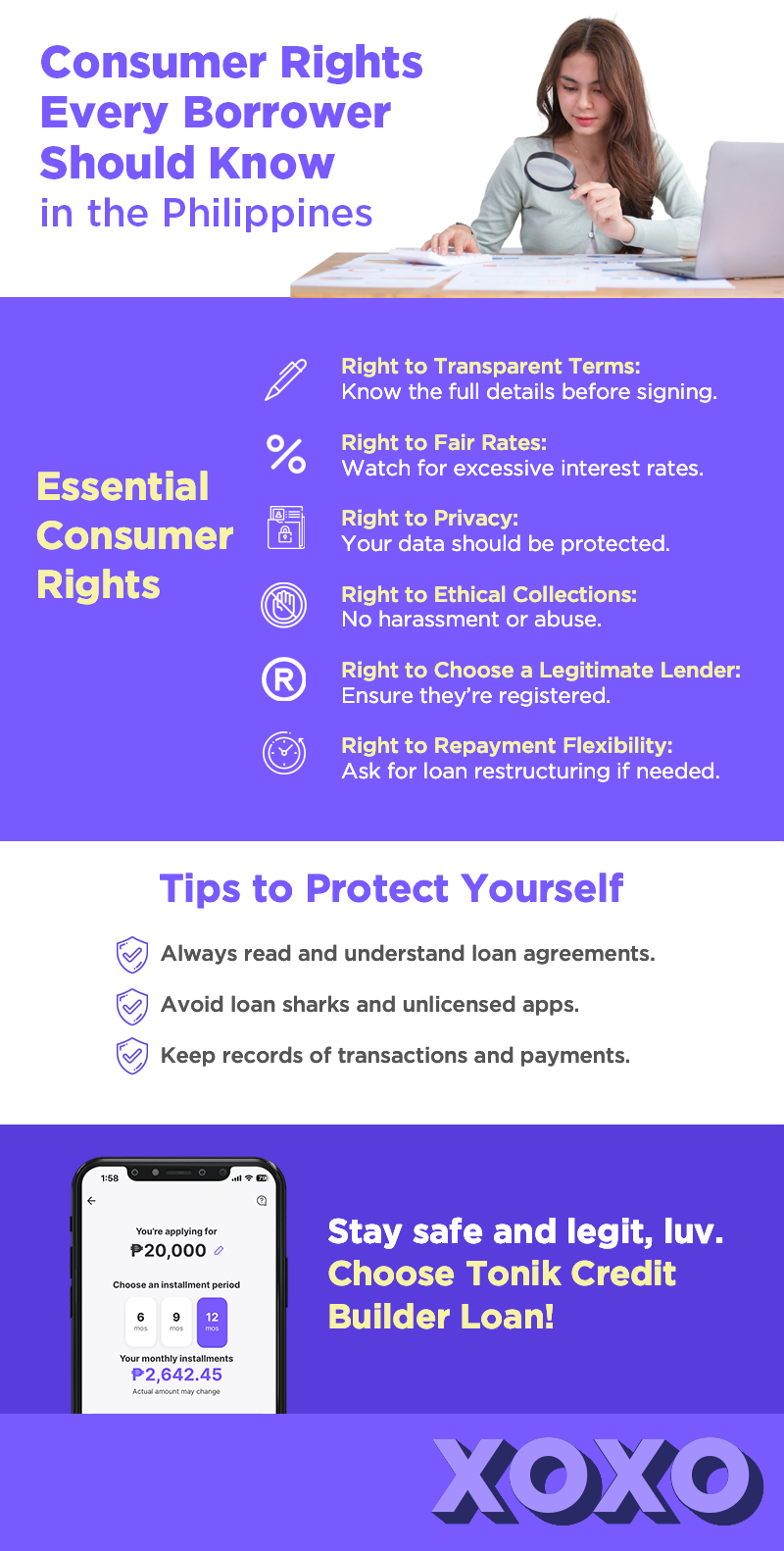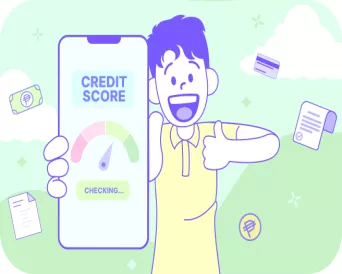
Consumer Rights Every Borrower Should Know in the Philippines
When applying for a loan, it can sometimes feel like you’re completely at the mercy of the lender. You feel powerless as you sit and wait for approval or (let’s hope this isn’t the case) rejection. But you have power, luv, and it comes in the form of consumer rights!
Remember that there are consumer rights in place for borrowers, and that they’re there to make sure lenders treat you fairly!
Ready? Let’s begin with key laws in the Philippines!
Table of Contents

Key Laws Protecting Borrowers in the Philippines
- Civil Code of the Philippines [Republic Act (RA) No. 386]: The law helps protect borrowers by making sure lenders can’t just charge interest out of nowhere. It has to be clearly written and agreed to. It also promotes fairness and honesty in loan agreements, so borrowers are treated fairly and aren’t stuck with unreasonable or surprise charges.
- Truth in Lending Act (RA No. 3765): This law makes sure lenders are upfront about the real cost of your loan. It’s there to help you understand exactly what you’re signing up for, so you’re protected from hidden charges or surprises.
- Consumer Act of the Philippines (RA 7394): This law helps protect borrowers by making sure financial products are advertised and offered in an honest and fair way. It gives you the right to clear, truthful information and protects you from misleading or unfair practices. If something goes wrong, it also ensures you have a way to speak up and seek help.
- Lending Company Regulation Act (RA No. 9474): This law was put in place to make sure lending companies play fair. It requires them to register with the Securities and Exchange Commission (SEC), be upfront about interest rates and fees, and avoid any form of harassment or abusive collection tactics.
- Financial Products and Services Consumer Protection Act (RA No. 11765): This law is all about making sure borrowers are treated fairly and honestly by financial institutions. It gives you the right to clear and transparent information, protects your personal data and assets from fraud, and ensures your complaints are handled quickly and properly. In short, it helps build trust and keeps the financial system safe and reliable for everyone.
- Data Privacy Act of 2012 (RA 10173): This is probably the most popular among consumer rights which everyone knows about. This act protects your personal information from being shared or misused by lenders. It requires them to handle your data responsibly and keep it confidential.
Essential Consumer Rights for Borrowers
- Right to Transparent Loan Terms: It’s your right to know all the loan terms upfront. That includes interest rates, fees, and the repayment schedule. There should be no hidden charges or misleading terms. Don’t get duped, luv. Before signing anything, review the terms first to ensure you fully understand what you’re agreeing to. If things seem sketchy or unclear, ask away!
- Right to Fair Interest Rates and Fees: Interest rates are there for a reason. They’re the price you pay for the privilege of borrowing cash. However, it should be noted that interest rates should never be excessive. Don’t hesitate to ask a financial advisor for guidance if you have any doubts about a lender’s interest rates or fees.
- Right to Privacy and Data Protection: When you take out a loan, you’re required to provide some personal and financial information. It’s the lender’s job to keep them safe. If you believe a lender has violated your privacy or leaked your personal information, you have the right to report the breach to the National Privacy Commission (NPC) and seek legal remedies.
- Right to Ethical Debt Collection Practices: Debt collectors must follow ethical practices when collecting loans. They should never use threats, harassment, public shaming, and other abusive tactics. Always know your rights and take action if you feel your dignity is being violated. Want to learn more? Read about collection agency harassment.
- Right to Choose a Legitimate Lender: It is essential to ensure that the lending company you are dealing with is legally registered and regulated. Verify that the lender is registered with the SEC or with the Bangko Sentral ng Pilipinas (BSP) if they’re a bank to ensure they are legitimate. Be cautious of predatory lenders or loan scams, which may promise fast loans but come with hidden fees or high interest rates.
- Right to Repayment Flexibility and Fair Treatment: Struggling to make loan payments? Good news: you have the right to ask for repayment flexibility. This can include loan restructuring or assistance with deferment. Communicate openly with your lender so you can explore available options and work together to come to an agreement that can benefit the both of you. Don’t forget – they can’t force you into unfair repayment conditions or punish you in ways that are beyond what’s outlined in your contract.
Consumer Rights: Common Violations and How to Report Them
While most lending institutions follow the rules, some may still engage in unfair or illegal practices. It’s not enough that you know your consumer rights. Stay vigilant and know when they’re violating your consumer rights!
- Misleading Loan Terms: If a lender is not transparent about the loan terms, including the interest rate, repayment schedule, or hidden fees, this could be a sign of unfair lending practices.
- Excessive Interest Rates: If a lender is charging you with an unrealistically high interest rate, don't hesitate to consult a financial advisor.
- Harassment or Threats: Debt collectors engaging in threatening, abusive, or humiliating behavior, such as public shaming or using aggressive tactics, are violating ethical debt collection practices.
- Unlicensed Lenders: If a lending company is not registered with the SEC or is not a bank licensed by the BSP, then they are not authorized to grant loans.
- Improper Use of Personal Data: Lenders must protect your personal information. If your data is sold or misused without your consent, this is a breach of your privacy rights.
Always keep an eye out for collection agency harassment - that’s a red flag! If you encounter any of these sample practices, don’t hesitate to report it.
Tips for Borrowers to Protect Themselves
Before we let you go, here are some helpful tips about consumer rights that you should know!
- Always Read and Understand Loan Agreements Before Signing: Before signing any loan agreement, take the time to read all the terms and conditions. Make sure you fully understand the interest rates, fees, repayment schedule, and any penalties. Never rush into signing something you don’t fully comprehend.
- Avoid Loan Sharks and Unlicensed Lending Apps: Loan sharks are unlicensed lenders who charge exorbitant interest rates and often use threats and intimidation to collect debts. Never borrow from unlicensed lending apps or companies that are not registered with the SEC or BSP. Always verify a lender’s legitimacy before agreeing to any loan.
- Keep Records of Loan Transactions and Payments: Keep detailed records of all your loan transactions, including the amount borrowed, interest rates, repayment dates, and any fees paid. This documentation will be helpful if any disputes arise or if you need to report any violations. Save your receipts and take screenshots of payment confirmations when using online apps.
Know Your Consumer Rights
By following these tips and staying informed about your rights, you can safeguard yourself against unfair lending practices and ensure a smooth borrowing experience.
Now, ready to apply for a safe and legit loan? Choose Tonik Credit Builder Loan! Not only will you get extra cash (up to P20K!) with just minimum requirements, you can also start building good credit!
Download the Tonik App and apply today!





